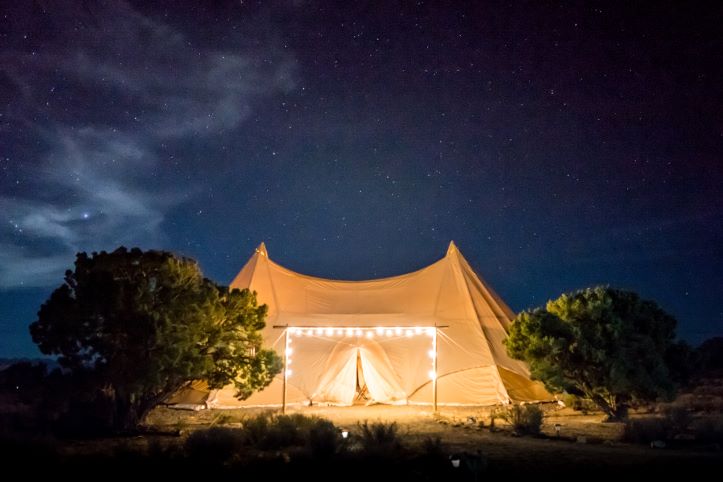Have you ever wondered what does 3 season tent mean? Well, let me give you a quick answer. A 3-season tent is designed to withstand the demands of spring, summer, and fall camping trips. It offers protection against mild weather conditions like rain, wind, and moderate temperatures. But why is it important to choose the right tent for different seasons? That’s precisely what this blog post aims to explore.
Having the correct tent may make or break your outdoor experiences. Just picture yourself in a sudden rainstorm with a tent that isn’t prepared for heavy rain, or shivering in the cold because your tent isn’t built for winter camping. Your comfort, safety, and enjoyment of your camping trip will all be enhanced if you choose a tent that is appropriate for the season.
We’ll go into more detail about the features and benefits of a 3-season tent and how to pick the best one for your camping trips in the parts that follow. Let’s delve in and find out what makes these shelters so adaptable.
Understand the Seasons and Tent Ratings
When it comes to camping, understanding the seasons and tent ratings is crucial for choosing the right equipment. Let’s break it down.
When going camping, it’s important to know the weather conditions as well as the tent’s rating. Okay, let me explain it to you in simple terms.
The first natural phenomenon is the cycle of the three seasons. Temperatures are mild and there is some rain in the spring. While summer is celebrated for its balmy temperatures and extended daylight, autumn is prized for its crisp air and brilliant leaves. Each season has its own set of weather variables that can make or break a camping trip.
Seasonal ratings for tents are a major factor in choosing the right tent for your needs. Ratings for how well a tent keeps out the elements are often given in terms of how many “seasons” the tent is designed to withstand. A three-season tent can be used during the spring, summer, and fall. It’s well-ventilated and protects from light rain and wind, making it suitable for the warmer months.
It’s vital to remember that 3-season tents have their limits when the weather gets really bad. They might not hold up well in extreme cold, blizzard conditions, or high winds. Winter or four-season tents are ideal for camping in such severe weather.
Although they have their limitations, 3-season tents are great for the vast majority of camping excursions. They are perfect for outdoor activities like backpacking, hiking, and camping since they have the right amount of durability, weight, and ventilation.

Characteristics of a 3-Season Tent
Three-season tents have various advantages over other types of tents. Let’s take a closer look at what makes 3-season tents so sought after, shall we?
Durable Materials: The materials used in their construction are one of the key differentiating factors for 3-season tents. They are often crafted from polyester or nylon, which are both lightweight and robust. Tents made from these materials have great strength-to-weight ratios, making them portable enough for use on hiking expeditions without sacrificing weather protection.
Great Ventilation:Having adequate ventilation is essential for a pleasant camping experience, particularly in warmer months. In order to improve ventilation without sacrificing protection from insects or the environment, 3-season tents are constructed with several mesh panels and vents in appropriate locations. This feature of the tent’s design promotes airflow, reduces the likelihood of condensation, and facilitates temperature control inside the tent.
Waterproof Rainfly: The rainfly is a crucial part of every three-season tent. A tent’s rainfly is an outside cover that’s designed to keep water out of the main tent. It provides a seal that stops rain from penetrating the tent. In order to stay dry and comfortable during sudden rain showers or wet circumstances, proper waterproofing is essential.
Others: Three-season tents are designed to survive a wide range of climates and typically have lightweight and strong tent poles, user-friendly zippers, and reinforced stitching.
Advantages and Disadvantages of 3-Season Tents
Three-season tents are convenient for camping in mild climates, but their limits should be taken into account. Let’s take a look at the upsides and downsides of these adaptable tents.
Advantages of 3-Season Tents
Suitable for Moderate Weather: Camping in the spring, summer, and fall is a breeze in a tent made for all three seasons. During most camping trips in these seasons, you won’t have to worry about getting wet or cold thanks to the solid protection they provide against light to moderate rain and moderate winds.
Lightweight and Easy to Set Up: These tents are great for hikers and trekkers who want to minimize the weight of their gear. Their portability and simplicity make them perfect for folks who frequently camp in new settings or who are short on time.
Disadvantages of 3-Season Tents
Limitations in Harsh Winter Conditions: The intense cold, heavy snowfall, and strong winds are beyond the capabilities of a 3-season tent. They might not be warm or safe enough to use in really cold climates.
How to Choose the Right 3-Season Tent
If you want to have a good time camping, you need to get a 3-season tent. Here are some things to consider while choosing a tent for your camping trips:
Consider Tent Capacity, Weight, and Livability: Find out how many people you’ll need to fit in the tent. Find a tent with enough of room for everyone to sleep and keep their belongings. Those who intend to go trekking or backpacking should think about the tent’s weight. Also, make sure you have enough headroom, storage space, and inner pockets to make your camping trip comfortable.
Evaluate the Camping Location and Expected Weather Conditions: Before setting out on a camping trip, it’s important to consider the terrain and climate you’ll be experiencing. Choose a tent with dependable waterproofing and a sturdy rainfly if you anticipate a lot of rain. Tents with strong pole systems and reinforced construction are ideal for places prone to high winds. When you know what kind of weather you’ll be camping in, you can pick out a tent that will keep you dry and comfortable.
Research and Read Customer Reviews: Do your homework and study review content before making a major buy. Find out what other people’s experiences have been like using the tents you’re looking at. Their thoughts on the tent’s functionality, longevity, ease of assembly, and general happiness might be extremely instructive. The internet is rife with useful resources, including outdoor discussion groups and sites that objectively review gear.
Recommendation for Extreme Weather Camping
A winter or 4-season tent is a good investment if you plan to camp in snowy or cold climates. The increased durability, added poles, and increased insulation in these tents make them suitable for use in the hard winter climate.
3-Season Tent vs. 4-Season Tent
4-Season Tent Meaning
A 4-season tent, also known as a winter tent or an all-season tent, is a form of tent that can endure snow, high winds, and low temperatures. Four-season tents are constructed to give consistent shelter and protection in adverse settings throughout the year, as opposed to the three-season tents that are mostly useful for the spring, summer, and fall.
It’s crucial to be aware of the distinctions between 3-season tents and 4-season tents. Compare and contrast these two tents to see the key differences:
Seasonal Suitability
The main distinction is in how well each style works during different seasons. Camping throughout the spring, summer, and fall is ideal for these tents. They provide adequate protection from light to moderate precipitation, wind, and temperature.
Contrarily, 4-season tents (sometimes called winter tents) are constructed to resist severe weather conditions throughout the year, including snow, wind, and low temperatures.
Strength and Durability
Four-season tents are constructed to withstand greater wear and tear than their three-season counterparts. In order to handle the weight of snow, the gusting winds, and the general wear and tear of winter camping, these tents often have stronger poles, thicker fabrics, and a more robust design.
Because of their focus on portability and airflow, three-season tents are often made with lightweight materials and construction that can’t resist the rigors of harsh weather.
Ventilation and Insulation
Three-season tents are the best option for hot weather because of their superior ventilation. To prevent moisture buildup, they are outfitted with plenty of vents and open mesh panels.
On the other hand, 4-season tents focus on insulation to keep you comfortable in the winter. To prevent drafts and keep the interior warm, they use less mesh and more solid cloth.
Weight and Packability
Because of their increased durability and feature set, 4-season tents are often larger and heavier than their 3-season counterparts. Because of this, they are not ideal for carrying light or using as a backpack.
For campers who value portability and simplicity of assembly, a 3-season tent’s lightweight construction and compact packing choices offer a clear advantage.
Deciding Between a 3-Season or 4-Season Tent: A Guide to Making the Right Choice
The quality of your camping trip can be drastically altered by your decision between a 3-season and 4-season tent. Here are some things to think about when you make your decision:
Camping Season
Find out when you prefer to go camping the most. A three-season tent is adequate for spring, summer, and fall camping. A 4-season tent is recommended, however, if you are camping in the winter or in areas with extreme weather.
Weather Condition
Think about the typical weather conditions of the places you plan to camp. Tents that can withstand three seasons of weather have features like high ventilation and waterproof flooring. The elements of snow, wind, and cold are no match for a quality 4-season tent.
Temperature and Insulation
Think about the variety of temperatures you can expect when camping. Tents rated for three seasons give adequate protection from the elements during warmer weather, while those rated for four seasons provide extra warmth throughout the winter. A 4-season tent will keep you warm enough to camp in the snow and ice.
Durability and Strength
Evaluate the durability and strength requirements based on your camping activities. 3-season tents are lightweight and suitable for backpacking or camping in less extreme environments. 4-season tents are heavier but built to withstand more challenging conditions, making them ideal for mountaineering or winter camping.
Budget and Usage
Take into account your spending limits and the frequency of tent use. Due to their specific construction, 4-season tents are typically more expensive. A three-season tent could be the better option if you only camp sometimes or if money is tight.
Conclusion
Keep in mind that camping vacations can be taken any time of the year with the right choice of a 3-season tent. They let in plenty of air, keep the rain out, and are lightweight enough to bring anywhere. However, a 4-season tent’s durability and insulation become vital if you plan to camp in extreme weather conditions or throughout the winter.
Consider your camping demands, the expected weather, and your budget before making a final decision on a tent. Learn more about your options by reading reviews written by previous customers and getting recommendations from seasoned campers.
It’s time to pack up your tent and head out on a camping trip full of new experiences and fond memories. Have fun camping and don’t forget to share your stories with others!
